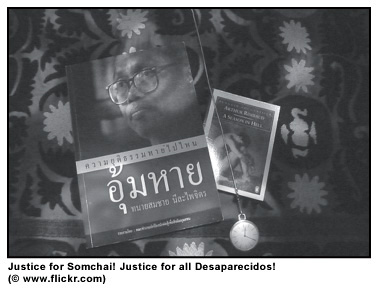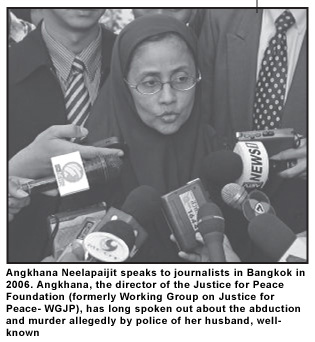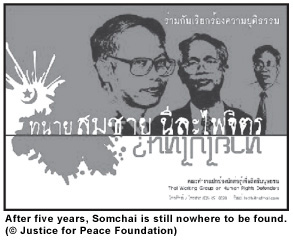|
UP
MIDDLE
DOWN Editorial |
NEWS FEATURES
by Pratubjit Neelapaijit
Almost six years since prominent Muslim lawyer, Somchai Neelapaijit was forcibly disappeared by five police officers in central Bangkok on 12 March 2004. His disappearance is believed to be the consequence of his work as a lawyer in representing clients allegedly tortured by the police. To this date, there is still no substantial progress made regarding his case. Mr. Neelapaijit’s disappearance has been accepted as a special case by the Department of Special Investigation (DSI) since July 2005. His fate remains unknown and no one has been held accountable for the crime. Worse still, the key witnesses to the case and their families have been subjected to intimidation and threats. The case, which received widespread national and international attention, is seen as emblematic of the difficulty of achieving justice vis-à-vis serious human rights violations in Thailand. Somchai Neelapaijit was fifty-three years old at the
time of his disappearance. He had practiced law for more than twenty
years, was the chairperson of the Muslim Lawyers’ Club and
vice-chairperson of the Thai Human Rights Committee of the Lawyers’
Council. Many of the cases he worked on were regarded as politically
controversial. Since 1983, he had represented a number of clients
charged with alleged terrorism-related offenses, many relating to the
long-standing low-level insurgency in the southern border provinces of
Thailand – Pattani Yala and Narathiwat. On 4 January 2004, there was a
robbery of military weapons from an army camp in the deep south. In
response to the gun robbery, the government of Prime Minister Thaksin
Shinawatra declared martial law in the affected provinces. Somchai was
asked to represent some of the suspects. He played a key role in
collecting fifty thousand signatures to request that martial law be
lifted. Based on the torture allegations, Somchai Neelapaijit issued a
court petition requesting the release of the 5 detained men. The
petition was rejected. On 11 March 2004, Somchai Neelapaijit submitted a
petition alleging abuse to the Ministry of Justice, the Ministry of
Interior, the Royal Thai Police, the Attorney General’s Office, the
National Human Rights Commission, the Prime Minister and the officer of
the Senate. The following day, 12 March 2004, Somchai Neelapaijit was
seen to have been forced getting into the other car and never returned
since then. Neelapaijit is widely known as one of the key cases that has affected trust in the justice process and the rule of law in Thailand. So far, only the case of this missing human rights lawyer was taken to court. However, even in this prominent case, the government has continuously intervened in the investigation and obstructed justice as it implicates the high ranking police officers and therefore, very political.
In the process of investigation and searching for the body of Somchai Neelapaijit, although several former government officials, including a former Prime Minister and the Attorney General, have publicly stated that they know that Mr. Neelapaijit was killed, until now, no substantial progress has been made. This case is being handled by the DSI. In over past four years that the DSI has accepted to take charge of this case, attempts have only been made to acquire evidence from the Maeklong River, Ratchaburi province. So far, 4 two hundred-liter drums have been excavated and are believed to have been used for destroying the body of Mr. Neelapaijit. Some human remains were also found, but after a forensic test, it was found out that the bones did not match the genetic pattern of the disappeared lawyer. There have been further developments in the Somchai case. One of which is that Police Lt. Gen. Panupong, head of Police Region 7 (Ratchaburi province) withdrew from his post and Police Gen. Tanee, the chief investigator of the Somchai case within the DSI is now looking for new evidence and witnesses in the area. At the same time, the National Counter Corruption Commission (NCCC) is preparing to deliver their investigation results into the torture allegations brought forward by Somchai Neelepaijit before he disappeared. Meanwhile, compensation is commonly used by the Thai government to discourage further demands or actions by victims’ families as was attempted in the cases from Southern Thailand. Despite this, Angkhana still persists in seeking for truth and justice for her husband. On the witness protection, in the morning of 7 June 2009, the car which belonged to Somchai Neelapaijit, was broken. The Honda Civic was parked in front of the house of the Neelapaijit family in Bangkok. The small window on the right had the side of the car broken in order to unlock the door. Several of Somchai’s belongings were moved within the car including a prayer’s hat, an Al Qur’an, and a mobile phone charger, but nothing was stolen even if it contained valuables such as a radio-tape player. Angkhana Neelapaijit reported the break-in to the head of the DSI head, to the head of police as well as to the local police and her lawyer. The local police and a forensic investigation team arrived at the house quickly and took finger prints. An umbrella and broken window were subsequently found in a garbage opposite the house. At about 2 am of 10 June 2009, Angkhana Neelapaijit’s car, Honda Accord with license plate Por Yor 8574, which parked in front of Angkhana’s house at 73/5 Soi. Isaraphap 11, Isaraphap Road, Thonburi, Bangkok was broken in the same way as Somchai’s car was broken into on 7 June 2009. Nothing inside the car was stolen but a little purse and cards were dropped in a trash bin opposite the house. Everything happened in the same way as Mr Somchai’s car was previously destroyed. At that instance, the officers were investigating the finger prints and had not found any matching finger prints taken during the investigation of the break-in into Somchai’s car. Also, finger prints could not be matched to any person filed with a criminal record by the police. The police have set up a CCTV camera outside the house and assigned civil police officers to guard the house.
Furthermore, the disappearance of Mr. Somchai Neelapaijit is related to the alleged torture of the 4 January 2004 gun robbery suspects while being detained by several high ranking police officials. The case is being investigated by the National Counter Corruption Commission (NCCC). But due to slow justice process and inefficient witness protection, witnesses in this case and their families are living in fear and unable to live normal lives. In November 2009, the Justice for Peace Foundation has recently received information that 3 of the witnesses are now being charged with making a false statement of torture by Pol. Maj. Gen. Chakthip Chaijinda. The police officer charged Mr. Suderueman Malae, with having made a false statement. The plaintiffs filed the complaint with the Bangkok Criminal Court which is now in the process of calling for evidence. At the same time, the plaintiffs have requested to obtain access to the investigation report from the NCCC which they have not yet made available. Again, this constitutes another tactic by police officers to abuse their powers and threaten victims to protect themselves. According to Mr Suderueman, these two police officers were among the group who allegedly tortured the five men. As a result of these developments, Angkhana Neelaphaijit submitted a letter to Mr. Wicha Mahakhum, of NCCC in order to request the latter not to send the testimony of the defendants contained in the investigation report to the plaintiffs due to the sensitivity of the information and protection of the defendants. The Justice and Peace Foundation sent an open letter concerned with the security of the defendants, their relatives as well as the lawyer involved in the case and therefore plans to observe the trial. It also called on the international community to raise these concerns with the Thai government, particularly the Royal Thai Police to ensure the safety of the defendants as well us fair process and trial.. On 9 November 2009, the NCCC refused to send the information to the plaintiffs. Lately, one of the key witnesses of this case, Mr. Abdulah Arbukaree was made to disappear on 11 December. He had been waiting for years to testify as a witness in the Court. During late November, he has gone to his hometown in one of the southern border provinces and since then, disappeared for nearly two weeks now. Should the case of Mr. Abdulah Arbukaree later turn out to be an enforced disappearance, it shall inflict a horrendous threat to other witnesses in this case and those of other cases. Their confidence in their safety and trust in the efficiency of the justice system to hold the perpetrators liable will be gravely eroded. On the fifth anniversary of the disappearance of human rights lawyer Somchai during the interactive dialogue with the Chairperson of the UNWGEID on the occasion of the March 2009 session of the UN Human Rights Council, the Canadian delegation raised the Somchai case in a question aimed at the working group, asking for details on the progress of the case. In response, the Thai government again reconfirmed its commitment to take all allegations of disappearances very seriously and put all efforts in addressing the cases in accordance with the rule of law and principles of justice. Regarding the Somchai case, the delegation mentioned that the new prime minister Abhisit had met recently with Angkhana to assure her that the Thai government is determined to do its utmost best to bring the case to a conclusion based on the rule of law. At the same time, newly appointed Prime Minister Abhisit Vajajiva announced the Government’s intention to ensure swift and meaningful progress in investigating and bringing to justice the perpetrators of Mr. Neelapaijit’s enforced disappearance.
As a result of the continuing failure of the government to seriously address the issue of disappearances in Thailand and the ongoing culture of impunity, manifested by the lack of prosecutions coupled with the lack of remedies for the families, enforced disappearances remain a problem of the Thai society. While the number of cases seems to have dropped over the years, families continue to live in fear and poverty. According to the UNWGEID mandate, cases are considered closed when the whereabouts of the missing have been established. While Justice for Peace Foundation welcomes more cooperation by the government with the UNWGEID in responding to communications sent, it remains obvious that little action is done by the government to establish the truth and hold perpetrators accountable. Particularly under the current administration, a request for an official visit by the UNWGEID could support those within the government trying to move investigations ahead as they would be able to legitimize their actions. At the same time, an official visit would most definitely support those individuals and organizations working on the issue of disappearances and with victims’ families in the same sense that it would add legitimacy to their work. The fact that the current government has announced publicly several times that it is seriously considering ratifying the Convention for the Protection of all Persons From Enforced Disappearance provides another ground for a visit of the UNWGEID to further promote the realization of this commitment. Pratubjit Neepalaijit is the daughter of disappeared lawyer, Somchai Neelapaijit. Accompanying her mother and a number of victims of disappearances in the southern part of Thailand, she works for the Justice for Peace Foundation as the focal person of the AFAD in Thailand.
VOICE March 2010 |
|
Copyright 2010
AFAD - Asian Federation Against
Involuntary Disappearances |
|

 Somchai
Neelapaijit and sentenced him to three years of imprisonment. Angkhana
Neelapaijit recently petitioned the civil court to declare her husband
missing so she could take control of his assets. The civil court took up
the petition and declared on 18 May 2009 that Somchai was a missing
person as he had been missing for five years. It was also reported in
the Bangkok Post on 19 May 2009 that the officer, Pol Maj Ngern Thongsuk
of the Crime Suppression Division, who was sentenced to three years in
jail in connection with Somchai’s disappearance, is believed to have
fled the country after having been released from jail while appealing
the verdict. Earlier this year, he had reportedly gone missing in a
flood. Angkhana requested the police at the time to investigate the
whereabouts of the officer’s body which, to this date, has not yet been
found.
Somchai
Neelapaijit and sentenced him to three years of imprisonment. Angkhana
Neelapaijit recently petitioned the civil court to declare her husband
missing so she could take control of his assets. The civil court took up
the petition and declared on 18 May 2009 that Somchai was a missing
person as he had been missing for five years. It was also reported in
the Bangkok Post on 19 May 2009 that the officer, Pol Maj Ngern Thongsuk
of the Crime Suppression Division, who was sentenced to three years in
jail in connection with Somchai’s disappearance, is believed to have
fled the country after having been released from jail while appealing
the verdict. Earlier this year, he had reportedly gone missing in a
flood. Angkhana requested the police at the time to investigate the
whereabouts of the officer’s body which, to this date, has not yet been
found. Angkhana
Neelapaijit believes that this latest incident is a threat to her and
her family due to the ongoing pressure and developments regarding the
disappearance of her husband. She has had several meetings with high
ranking officials, including the Prime Minister and Minister of Justice
in order to lobby for greater action. In March 2009, the case was
highlighted by the Canadian delegation during the reporting of the
Working Group on Enforced or Involuntary Disappearances at the Human
Rights Council at the time of the public commemoration in Bangkok of the
fifth anniversary of Somchai’s disappearance. Moreover, in a Joint Press
Statement of the Secretary General of the OIC and H.E. Nitaya
Pibulsongram, the Minister of Foreign Affairs in May 2007 followed by
the Reports of the Secretary General on Muslim Communities in Non- OIC
Member States submitted to the 36th session of the Council of Foreign
Ministers in May 2009, the OIC urged the government to clear the cases
of Tak Bai, Krue Se and Somchai’s disappearance.
Angkhana
Neelapaijit believes that this latest incident is a threat to her and
her family due to the ongoing pressure and developments regarding the
disappearance of her husband. She has had several meetings with high
ranking officials, including the Prime Minister and Minister of Justice
in order to lobby for greater action. In March 2009, the case was
highlighted by the Canadian delegation during the reporting of the
Working Group on Enforced or Involuntary Disappearances at the Human
Rights Council at the time of the public commemoration in Bangkok of the
fifth anniversary of Somchai’s disappearance. Moreover, in a Joint Press
Statement of the Secretary General of the OIC and H.E. Nitaya
Pibulsongram, the Minister of Foreign Affairs in May 2007 followed by
the Reports of the Secretary General on Muslim Communities in Non- OIC
Member States submitted to the 36th session of the Council of Foreign
Ministers in May 2009, the OIC urged the government to clear the cases
of Tak Bai, Krue Se and Somchai’s disappearance. One
year had passed. Although the Royal Thai Government by the Rights and
Liberties Protection Department, Ministry of Justice had done the
research on readiness of Thailand in ratifying the Convention of All
Persons From Enforced Disappearance and the government seems to have the
political will to stop and prevent the problem of enforced disappearance
in Thai society and intends to ratify the Convention, nothing concrete
has so far, materialized in this regard because the government is still
stuck with the problem of instability.
One
year had passed. Although the Royal Thai Government by the Rights and
Liberties Protection Department, Ministry of Justice had done the
research on readiness of Thailand in ratifying the Convention of All
Persons From Enforced Disappearance and the government seems to have the
political will to stop and prevent the problem of enforced disappearance
in Thai society and intends to ratify the Convention, nothing concrete
has so far, materialized in this regard because the government is still
stuck with the problem of instability.